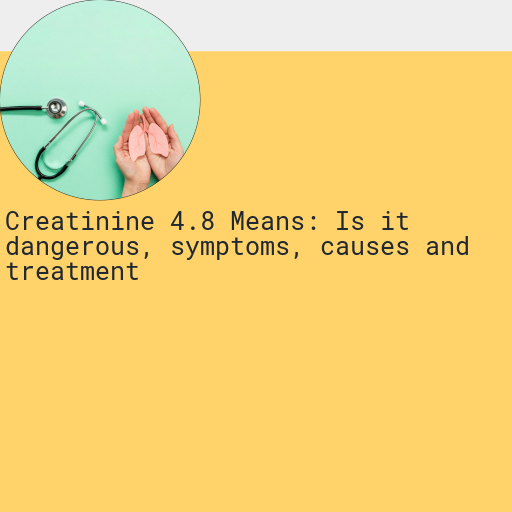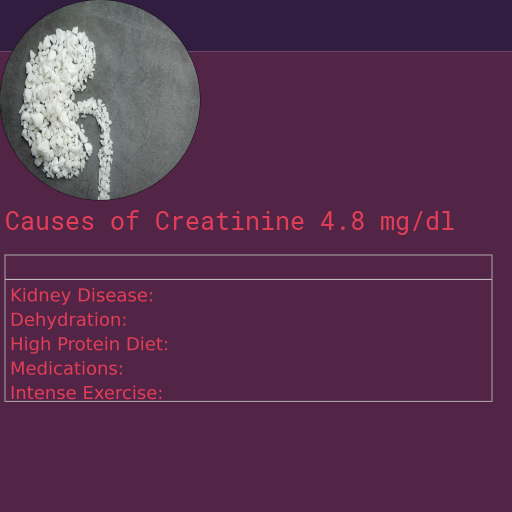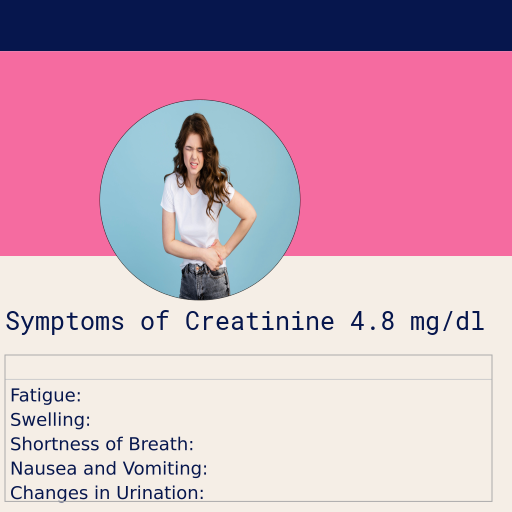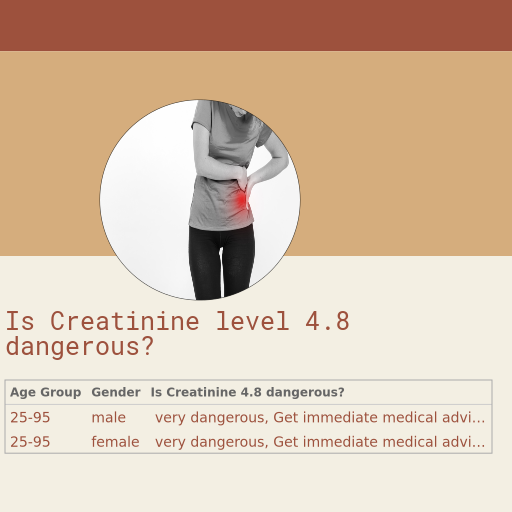Creatinine 4.8 : Is it Dangerous, Causes, Symptoms and More
When it comes to understanding your health, few indicators are as crucial as your creatinine levels. Elevated creatinine, particularly a level of 4.8, can be a significant marker of underlying health issues that warrant immediate attention. This blog delves into the potential dangers associated with high creatinine levels, exploring the various causes and symptoms that might be affecting your body. By understanding these factors, you can take proactive steps to manage your health effectively and seek the appropriate treatment to mitigate any risks.

What is Creatinine
Creatinine is a byproduct of protein breakdown that serves no useful purpose in the body. It is essentially a waste product generated from the normal wear and tear on muscles. As such, the body needs to eliminate it efficiently to maintain optimal health. High levels of creatinine in the blood can indicate that the kidneys, which are responsible for filtering out this waste, are not functioning properly. Monitoring creatinine levels is crucial for diagnosing and managing potential kidney issues, as this waste product can accumulate and pose serious health risks.
- Dietary Protein: High-protein foods such as red meat, poultry, and fish can increase creatinine levels in the blood.
- Muscle Metabolism: Creatinine is a waste product generated from muscle metabolism. Individuals with higher muscle mass typically have higher baseline creatinine levels.
- Supplements: Certain supplements, especially those containing creatine or protein powder, can elevate creatinine levels.
- Medications: Some medications, including nonsteroidal anti-inflammatory drugs (NSAIDs) and certain antibiotics, can affect creatinine levels.
- Dehydration: Lack of sufficient water intake can lead to a higher concentration of creatinine in the blood.
- Kidney Function: Impaired kidney function is a primary cause for elevated creatinine levels, as the kidneys are responsible for filtering it out of the blood.
- Exercise: Intense physical activity can temporarily raise creatinine levels due to increased muscle breakdown.
Normal Range of Creatinine in Adults
The normal range of creatinine levels in adults can vary depending on several factors such as age, sex, and muscle mass. Generally, for adult men, the typical range is about 0.6 to 1.2 milligrams per deciliter (mg/dL), while for adult women, it is approximately 0.5 to 1.1 mg/dL. These values are considered standard benchmarks for assessing kidney function. It's essential to understand that creatinine levels outside of this range may indicate underlying health issues, particularly related to kidney function, and should be evaluated by a healthcare professional.
| Age Group | Normal Creatinine Range (mg/dL) |
|---|---|
| Infants (0-1 year) | 0.2 - 0.4 |
| Children (1-12 years) | 0.3 - 0.7 |
| Adolescents (13-18 years) | 0.5 - 1.0 |
| Adults (Male) | 0.6 - 1.2 |
| Adults (Female) | 0.5 - 1.1 |
| Elderly (60+ years) | 0.6 - 1.2 |
Causes of Creatinine 4.8
Elevated creatinine levels can be a significant health concern, often indicating potential issues with kidney function. Creatinine is a waste product produced by muscles from the breakdown of a compound called creatine. It's transported to the kidneys through the bloodstream, where it is filtered out and excreted in urine. When levels of creatinine in the blood are higher than normal, it may suggest that the kidneys are not functioning properly. Various factors can contribute to this condition, including chronic kidney disease (CKD), dehydration, and certain medications. Understanding the underlying causes of elevated creatinine is essential for early detection and effective management of potential kidney-related issues.
- Kidney Disease: Chronic kidney disease or acute kidney injury can significantly raise creatinine levels.
- Dehydration: Lack of sufficient fluids can lead to elevated creatinine levels due to decreased kidney filtration.
- High Protein Diet: Consuming a diet rich in protein can temporarily increase creatinine levels.
- Medications: Certain drugs like nonsteroidal anti-inflammatory drugs (NSAIDs) and some antibiotics can affect kidney function, leading to higher creatinine.
- Intense Exercise: Vigorous physical activity can cause temporary spikes in creatinine due to muscle breakdown.
- Diabetes: Poorly managed diabetes can lead to diabetic nephropathy, affecting kidney function and increasing creatinine.
- High Blood Pressure: Hypertension can damage the kidneys over time, resulting in elevated creatinine levels.
- Urinary Tract Obstructions: Conditions like kidney stones or an enlarged prostate can obstruct urine flow and raise creatinine levels.

Symptoms of Creatinine 4.8
Experiencing elevated creatinine levels can be a concerning sign, as it often indicates potential kidney issues. Common symptoms of elevated creatinine can include fatigue, swelling or edema, shortness of breath, and a noticeable decrease in urine output. Additionally, individuals might experience nausea, confusion, or chest pain as their condition worsens. These symptoms should not be ignored, as they serve as critical indicators of underlying health problems that need prompt medical attention.
- Fatigue: Feeling unusually tired or weak.
- Swelling: Noticeable swelling in the face, ankles, or legs.
- Shortness of Breath: Difficulty breathing or feeling winded easily.
- Nausea and Vomiting: Frequent nausea or episodes of vomiting.
- Changes in Urination: Altered frequency or appearance of urine, such as foamy or dark-colored urine.
- Confusion: Difficulty concentrating or experiencing mental fog.
- High Blood Pressure: Elevated blood pressure levels, which may contribute to kidney issues.
- Muscle Cramps: Experiencing muscle cramps or spasms, particularly in the legs.

Dangers of Creatinine 4.8
When discussing creatinine levels, it’s important to understand that while creatinine itself does not directly harm the body, elevated levels of this waste product can be a significant indicator of underlying health issues, particularly kidney problems. A creatinine level of 4.8 is concerning because it often signals kidney failure or other serious conditions affecting renal function. Elevated creatinine levels suggest that the kidneys are not efficiently filtering waste from the blood. This inefficiency means that other harmful waste products, such as urea, can build up in the body, potentially leading to further complications and damage. Monitoring and addressing high creatinine levels is crucial for preventing these adverse effects and maintaining overall health.
- Kidneys: Elevated creatinine levels often indicate impaired kidney function, leading to chronic kidney disease or acute kidney injury.
- Heart: High creatinine can be associated with an increased risk of cardiovascular diseases such as heart attacks and heart failure.
- Liver: Though less common, elevated creatinine can sometimes be linked to liver dysfunction due to the interconnectedness of organ systems.
- Lungs: Kidney disease can lead to fluid buildup in the lungs, causing pulmonary edema and respiratory distress.
- Brain: High creatinine levels can contribute to neurological issues such as confusion, seizures, and encephalopathy.
- Muscles: Elevated creatinine can cause muscle weakness and cramping due to the accumulation of waste products.
- Gastrointestinal Tract: Kidney dysfunction linked to high creatinine can lead to nausea, vomiting, and loss of appetite.
- Skin: Chronic kidney disease can result in skin changes such as dryness, itching, and discoloration.
Home remedies for Creatinine 4.8
Disclaimer: Elevation in creatinine levels is a serious medical condition that cannot be effectively treated at home. It is crucial to seek professional medical advice and intervention. While basic supportive care such as maintaining adequate hydration, following a low-protein diet, and managing blood pressure can help, these measures alone are insufficient. Elevated creatinine levels often indicate underlying kidney issues that require specialized treatment and monitoring by healthcare professionals. Always consult your doctor for proper diagnosis and treatment.
- Stay Hydrated: Drinking plenty of water can help the kidneys flush out toxins and reduce the burden on them.
- Follow a Renal Diet: Adhering to a kidney-friendly diet, low in salt, potassium, and phosphorus, can alleviate the stress on your kidneys.
- Avoid Over-the-Counter Medications: Some pain relievers and other medications can be harsh on the kidneys, so always consult with your healthcare provider before taking any new medication.
- Monitor Blood Pressure: High blood pressure can further damage your kidneys. Using a home blood pressure monitor can help you keep track and manage it effectively.
- Limit Protein Intake: Consuming too much protein can make your kidneys work harder. Opt for moderate amounts of high-quality protein sources as advised by your healthcare provider.
Treatment for Creatinine 4.8
Medical treatment by a doctor is essential when dealing with a creatinine level of 4.8, as it indicates significant kidney impairment. The primary treatment goals include stabilizing kidney function to prevent further damage, stopping harmful drugs that might be contributing to the elevated creatinine levels, and treating infections that could be exacerbating the condition. By addressing these key areas, doctors aim to halt the progression of kidney damage and improve the patient's overall health.
- Medications: Doctors may prescribe specific medications to help manage the underlying condition causing elevated creatinine levels, such as high blood pressure or diabetes.
- Dietary Changes: A diet low in protein, potassium, and phosphorus can help reduce the strain on the kidneys and lower creatinine levels.
- Hydration: Ensuring adequate hydration can help the kidneys filter waste more effectively. However, fluid intake should be monitored, especially in patients with kidney issues.
- Lifestyle Modifications: Regular exercise, avoiding alcohol and smoking, and maintaining a healthy weight can improve overall kidney function and reduce creatinine levels.
- Dialysis: In severe cases of kidney impairment, dialysis may be necessary to manually filter waste products from the blood, thereby reducing creatinine levels.
GFR with Creatinine of 4.8
When discussing kidney function, the term Glomerular Filtration Rate (GFR) often comes up. GFR is a measure of how well your kidneys are filtering blood and removing waste, and it provides a more comprehensive picture of kidney health compared to just looking at creatinine levels. While a high creatinine level, such as 4.8, can indicate kidney issues, it does not provide the whole story. This is because creatinine levels can be influenced by various factors, including muscle mass, age, and hydration status. On the other hand, GFR accounts for these variables and offers a more accurate assessment of kidney function. Therefore, while elevated creatinine levels can be alarming, understanding your GFR will give you a clearer understanding of your kidney health.
| Grade | GFR (mL/min/1.73 m²) | Meaning |
|---|---|---|
| G1 | > 90 | Normal or high GFR |
| G2 | 60-89 | Mildly decreased GFR |
| G3a | 45-59 | Mild to moderately decreased GFR |
| G3b | 30-44 | Moderately to severely decreased GFR |
| G4 | 15-29 | Severely decreased GFR |
| G5 | < 15 | Kidney failure |
What is my GFR for a creatinine of 4.8
| Age | Gender | GFR |
|---|---|---|
| 18 | male | 15.92 ml/m2 |
| 45 | male | 13.22 ml/m2 |
| 60 | male | 12.47 ml/m2 |
| 80 | male | 11.76 ml/m2 |
| 18 | female | 11.82 ml/m2 |
| 45 | female | 9.81 ml/m2 |
| 60 | female | 9.25 ml/m2 |
| 80 | female | 8.73 ml/m2 |
Table of danger posed by Creatinine 4.8 in male across different ages
| Age Group | Is Creatinne of 4.8 dangerous? |
|---|---|
| 25yrs - 95 yrs | very dangerous, Get immediate medical advice and treatment. |
Table of danger posed by Creatinine 4.8 in female across different ages
| Age Group | Is Creatinne of 4.8 dangerous? |
|---|---|
| 25yrs - 95 yrs | very dangerous, Get immediate medical advice and treatment. |

Which other tests should be done for a creatinine value of 4.8?
In addition to monitoring creatinine levels, it's crucial to consider other diagnostic tests to get a comprehensive picture of kidney health. Tests for electrolytes such as sodium, potassium, and calcium can reveal imbalances that may affect kidney function. A detailed renal profile can provide insights into other markers like blood urea nitrogen (BUN) and glomerular filtration rate (GFR), which are essential for evaluating kidney performance. Additionally, blood gas levels can help assess the body's acid-base balance, offering further clues about metabolic functions and potential complications. Together, these tests can aid in forming a more complete diagnosis and guide more effective treatment plans.
- Electrolytes: Monitoring electrolytes like sodium, potassium, and chloride is essential, as abnormal levels can indicate kidney dysfunction and guide treatment decisions.
- Renal Profile: A comprehensive renal profile includes tests such as blood urea nitrogen (BUN) and glomerular filtration rate (GFR), which help assess the overall kidney function.
- Blood Gas Levels: Arterial blood gas (ABG) analysis measures oxygen and carbon dioxide levels in the blood, providing information on respiratory function and metabolic status, which can be affected by renal issues.
- HbA1c: This test assesses long-term blood sugar control and is crucial for patients with diabetes, as high creatinine levels can be related to diabetic nephropathy.
- Liver Enzymes: Tests for liver enzymes like ALT and AST help evaluate liver function, which can be compromised in advanced kidney disease or due to medications used to treat kidney issues.

 By: Dr.Bhargav Raut
By: Dr.Bhargav Raut